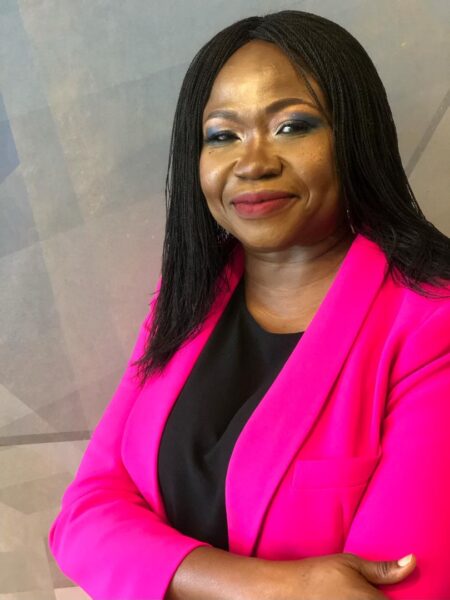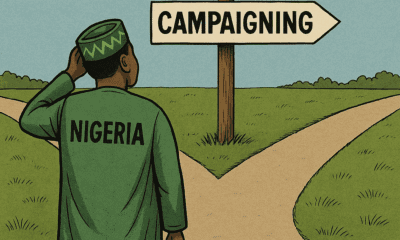Democracy & Governance
The Reality of Gender-Based-Violence (GBV) in Sub-Saharan Africa -By Prof. Uche Ofodile
The 2025 African Union Convention on Ending Violence Against Women and Girls defines GBV widely to include physical, emotional, psychological, verbal, sexual, and economic harm, as well as the deprivation of freedoms across both online and offline spaces, and during peace or conflict.

In 1999, through Resolution 54/134, the United Nations General Assembly established November 25 as a global day of reflection and action. The General Assembly recognized that violence against women is an obstacle to equality, development, and peace, and called on governments, civil society, and all stakeholders to raise awareness and mobilize solutions.
The world has made progress, but the crisis persists at alarming levels. According to the World Health Organization (WHO), approximately 1 in 3 women worldwide—about 30 percent—have experienced physical and/or sexual intimate-partner violence or non-partner sexual violence during their lifetime. This amounts to nearly one billion women. Recent WHO data from 2023 estimates that about 840 million women globally have survived either partner or sexual violence.
These numbers underline what the UN has repeatedly warned: violence against women and girls remains one of the most pervasive human rights violations in the world, and ending it must remain a global emergency.
This year’s theme, “UNiTE to End Digital Violence Against Women and Girls”, reminds me that violence today extends across physical spaces, communities, workplaces, and digital platforms. The epidemic is evolving, widening, and deepening.
How GBV stands today
In Africa, GBV is not confined to intimate relationships. It emerges in public and private life, on farms and plantations, in markets, in workplaces, and increasingly online. Many forms of GBV, including forced labour, trafficking, early and forced marriage, female genital mutilation, harmful traditional practices, and coercive control, continue to affect millions of rural women in Africa. According to a recent study of GBV across 25 Sub-Saharan African countries, a notable 44.94% of women reported experiencing at least one form of GBV, with the prevalence varying by country.
The 2025 African Union Convention on Ending Violence Against Women and Girls defines GBV widely to include physical, emotional, psychological, verbal, sexual, and economic harm, as well as the deprivation of freedoms across both online and offline spaces, and during peace or conflict.
Women and girls in rural areas bear the burden of Africa’s overlapping crises, including armed conflicts, farmer-herder clashes, climate crisis, environmental disasters, land disputes, and mass displacements. These conditions amplify vulnerabilities and expose rural women in particular to extreme levels of violence.
The Vulnerability of Rural Women Farmers and Agricultural Workers in Africa
Although violence affects women everywhere, Africa’s rural women, including farmers, pastoralists, fisherfolk, indigenous women, and rural workers, face heightened risk due to isolation, entrenched social norms, limited support systems, deeply rooted gender inequalities, limited access to economic resources. They are the backbone of Africa’s agricultural and blue economies, yet they experience fear at virtually every stage of the agricultural value chain, from production to processing to transporting and marketing.
Despite their indispensable role, barriers in land access, credit, and decision-making power continue to expose them to insecurity, exploitation, and abuse. GBV is intertwined with these longstanding inequalities, reinforcing cycles of poverty and disempowerment.
The Economic and Development Cost of Violence
GBV is not only a human rights crisis, but is also a public health emergency and a severe economic threat. The Food and Agriculture Organization has warned that GBV undermines food security, nutrition, rural development, and sustainable development goals. Evidence increasingly shows that GBV in the agricultural sector reduces agricultural productivity and weakens national economies.
According to analyses by the International Monetary Fund and the World Bank, gender-based violence can cost countries up to 3.7 percent of GDP. This means that GBV is not simply a private tragedy, but also constitutes a significant drag on Africa’s economic progress, affecting households, communities, and national development.
Progress and Commitments
I take hope in the fact that Africa has strong legal and policy frameworks supporting women’s rights, including the Constitutive Act of the African Union, the African Charter on Human and Peoples’ Rights, and the Maputo Protocol. Notably, 46 out of 55 AU member states have ratified the Maputo Protocol, affirming crucial protections for women’s dignity, bodily integrity, and freedom from harmful practices.
The African Union’s 2025 Convention on Ending Violence Against Women and Girls, which entered into force on May 28, 2025, represents another significant milestone. It details the obligation of states to end violence against women and protect girls in the world of work. It also calls for effective laws and policies, holistic services, coordinated enforcement, accurate data collection, and active community participation in ending violence.
The Challenges Ahead
Despite these commitments, the gap between law and practice remains significant. Structural inequalities, climate-induced disasters, food insecurity, land conflicts, and weakening biodiversity all intensify the vulnerability of rural women in Africa. Harmful norms around land ownership, inheritance, and decision-making reinforce risks and limit women’s access to justice or protection.
But these challenges are not insurmountable. We must do more to break barriers for rural women farmers and address the deeply rooted structural inequalities, the AU rightly noted in a May 2025 press release.
A Call to Reflect, Resolve, and Recommit
As we commemorate the 30th anniversary of the Beijing Declaration and the 26th anniversary of the International Day for the Elimination of Violence Against Women, I call on Africa and the world to move beyond symbolic commitments toward measurable and effective action. We owe it to our mothers, daughters, sisters, aunties, wives, and granddaughters to build a continent where every woman can live free from fear and violence.
What Must Be Done? Much of what must be done is already detailed in continental legal and policy instruments. It is now time to act!
Individuals, Communities, and Civil Society Organizations
- Speak boldly against harmful norms and practices.
- Raise awareness about the long-term harms and economic impacts of GBV.
- Create safe rural work environments.
- Engage men and boys as leaders and allies in prevention, response, and accountability.
Governments
- Support African women farmers, pastoralists, fisherfolks and rural workers, and expand opportunities for women in agribusiness ownership and leadership in rural Africa.
- Advance access to land, credit, and economic resources for rural women.
- Enforce laws that prohibit violence in all forms.
- Strengthen justice, health, and welfare systems.
- Collect and use gender-disaggregated data.
- Protect women in formal, informal, and digital workplaces from violence.
- Establish rehabilitation, reporting, and rapid response mechanisms.
Rural Businesses and Employers
- Adopt zero-tolerance policies on GBV.
- Integrate human rights due diligence into operations and supply chains.
- Provide safe, confidential reporting channels and ensure remedies.
Looking Forward
As Africa moves beyond the Beijing Declaration, the Maputo Protocol, and the AU Convention, we must usher in a new era—one that prioritizes implementation over rhetoric and action over intention. When Africa’s rural women are safe, empowered, and equipped, the continent benefits through increased agricultural productivity, strengthened food systems, and more equitable and sustainable development.
Ending violence against women is not only a moral imperative, but also an economic necessity, a human rights obligation, and a foundational step toward unlocking Africa’s full potential.
*Prof Uche Ofodile, a Harvard University Teaching Fellow is Africa’s representative in UNHRC Working Group on Peasants, Farmers and Rural Workers.










